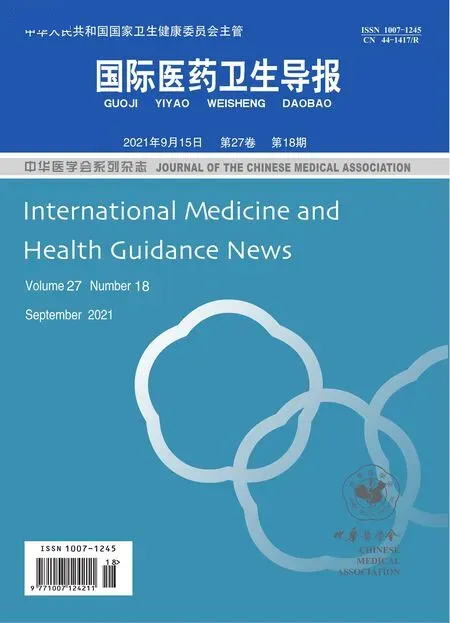傳染性單核細胞增多癥和傳染性單核細胞綜合征患兒PD-1以及Tregs差異比較
吳園園 潘艷艷 蔡紅嬌 紀軍 張利
遼寧省大連市中心醫院中心實驗室 116033
傳染性單核細胞增多癥(IM)是兒童時期常見的急性增生性疾病,由EB病毒(Epstein-Barr virus,EBV)感染引起,臨床以發熱、頭痛、咽峽炎、皮疹、非典型性淋巴細胞增多、淋巴結與肝脾腫大以及出現異性淋巴細胞為特征,除了EBV外,其他病原體也可以引起類似臨床癥狀的綜合征,為傳染性單核細胞綜合征(IMS)。雖然致病原不一,然而IMS與IM的臨床癥狀極為相似。IM一年四季均可發病,早期癥狀不典型,臨床表現多樣性,故在早期容易出現誤診或是漏診而導致嚴重后果[1]。目前國內外已對EBV所致的IM有較深的認識,EBV為常見的皰疹病毒,感染人體后主要宿主細胞是B淋巴細胞,B淋巴細胞可以表達很多EBV特異性抗原分子,而誘導機體產生相應抗原的特異性免疫應答[2]。EBV感染引起機體強烈的免疫應答反應[3],而對于IMS知之甚少,與IM患兒程序性死亡受體1(PD-1)以及調節性T細胞(Tregs)的比較還未見報道。本研究通過分析40例IM患兒實驗室檢驗指標,尤其是免疫細胞PD-1的表達情況以及Tregs數量,和IMS患兒進行比較,為IM與IMS的診斷和患兒免疫調節干預提供理論基礎。
1 資料與方法
1.1 臨床資料 選擇2016年1月至2019年9月大連市中心醫院兒科收治的40例IM患兒為IM組,均符合《褚福堂實用兒科學(第8版)》[4]中相關診斷標準。以同期收治的40例IMS患兒為對照,EBV DNA檢測為陰性。
1.2 外周血EBV DNA檢測 采集兩組EDTA-K2抗凝外周血2 ml,取1 ml采用Ficoll密度梯度離心法分離外周血單個核細胞,提取DNA,然后應用EBV核酸擴增熒光檢測試劑盒(達安公司)定量檢測單個核細胞EBV DNA含量,使用的實時熒光PCR儀器為ABIViia7。
1.3 流式細胞儀檢測 采集患者EDTA-K2抗凝外周血2 ml,檢測T淋巴細胞亞群(CD3+、CD3+CD4+、CD3+CD8+),CD4+T和CD8+T細胞PD-1的表達水平以及Tregs的百分數。所有抗體均購自美國BECKMAN COULTER。使用了以下這 些 抗 體:FITC-CD4、PE-CD8、PC5-CD3、FITC-CD8、PE-PD-1、PC5-CD4、FITC-CD4、PE-CD127、PC5-CD25。每100μl EDTA抗凝外周血加入20μl單克隆抗體,混勻并于暗處室溫孵育20 min。外周血加入1.0 ml溶血素,混勻,暗處室溫放置10 min。420×g離心5 min,棄上清,加入1 ml 1×PBS上機檢測。流式細胞儀為美國BECKMAN COULTERFC500。
1.4 外周血免疫球蛋白和補體水平檢測 采集患者外周血2 ml,凝固后1 710×g離心5 min,分離血清采用散射比濁法檢測血清免疫球蛋白G(IgG)、IgM、IgA,補體C3和C4水平。
1.5 外周血淋巴細胞計數和異型淋巴細胞計數 采集患者EDTA-K2抗凝外周血2 ml,使用希森美康XE-2100進行外周血細胞分類檢測,用奧林巴斯顯微鏡進行異型淋巴細胞計數,并計算出異型淋巴細胞百分比。
1.6 統計分析 計量資料呈正態分布時,使用(±s)表示,組間比較采用兩樣本均數t檢驗,計量資料不呈正態分布時(如異型淋巴細胞百分數),使用M(P25,P75)表示,組間比較采用秩和檢驗。計數資料采用χ2檢驗。數據用SPSS統計學軟件進行分析處理,以P<0.05為差異有統計學意義。
2 結 果
2.1 臨床資料 IMS組男24例,女16例,年齡(5.11±4.07)歲;IM組男22例,女18例,年齡(8.33±5.32)歲;兩組患兒臨床資料差異均無統計學意義(均P>0.05)。
2.2 外周血EBV DNA含量檢測 檢測兩組患兒外周血EBV DNA含量,IM組EBV DNA含量為18.45(4.73,103.33)×105copies/ml,IMS組EBV DNA含量為0。
2.3 白細胞數量比較 檢測兩組患兒外周血白細胞計數、淋巴細胞百分數和絕對值。研究發現IM組白細胞計數、淋巴細胞百分數和絕對值都明顯高于IMS組。同時檢測異型淋巴細胞百分數,IM組明顯高于IMS組。見表1。

表1 兩組患兒白細胞計數、淋巴細胞百分數、淋巴細胞絕對值和異型淋巴細胞百分數比較
2.4 抗體和補體的檢測 檢測外周血IgG、IgM、IgA水平,發現IgG和IgA水平在IM組明顯升高,而IgM水平在IM組有所升高但是兩組間差異無統計學意義。天然免疫系統分子補體C3和C4在IM組出現明顯降低。見表2。
表2 兩組患兒外周血抗體和補體水平比較(mg/dl,±s)

表2 兩組患兒外周血抗體和補體水平比較(mg/dl,±s)
注:IMS為傳染性單核細胞綜合征,IM為傳染性單核細胞增多癥,Ig為免疫球蛋白
組別IMS組IM組t值P值例數40 40補體C3 103.85±13.01 85.52±8.53-3.722 0.001補體C4 28.36±6.81 20.84±1.31-4.392<0.001 IgG 874.46±222.10 1 314.86±408.14 4.405<0.001 IgM 116.87±40.51 165.31±85.07 1.363 0.182 IgA 109.24±73.26 206.53±81.31 5.003<0.001
2.5 T淋巴細胞亞群百分數比較 檢測了外周血CD3+、CD3+CD4+、CD3+CD8+T細胞百分數。發現IM組CD3+CD4+T細胞數量明顯低于IMS組(t=-13.752,P<0.001),而CD3+CD8+T細胞和總CD3+T細胞明顯高于IMS組(t=-11.694,P<0.001;t=-3.290,P=0.002),見圖1。

圖1 40例傳染性單核細胞增多癥(IM)與40例傳染性單核細胞綜合征(IMS)患兒外周血T淋巴細胞亞群百分數比較。A為CD3+CD4+T細胞的百分數與流式圖,B為CD3+CD8+T細胞的百分數與流式圖,C為CD3+T細胞的百分數與流式圖
2.6 Tregs百分數檢測 對具有免疫調節功能的Tregs進行檢測發現IM組Tregs數量明顯低于IMS組(t=9.742,P<0.001),見圖2。

圖2 40例傳染性單核細胞增多癥(IM)與40例傳染性單核細胞綜合征(IMS)患兒外周血調節性T細胞(Tregs)百分數檢測。A為Tregs百分數,B為Tregs代表流式圖
2.7 PD-1表達分析 檢測兩組患兒外周血CD4+和CD8+T細胞PD-1的表達水平,發現IM組CD8+PD-1+細胞和總PD-1+細胞百分數均明顯高于IMS組(t=9.288,P<0.001;t=7.959,P<0.001),而CD4+PD-1+細胞百分數在兩組之間差異無統計學意義(t=0.177,P=0.860),見圖3。

圖3 40例傳染性單核細胞增多癥(IM)與40例傳染性單核細胞綜合征(IMS)患兒外周血程序性死亡受體1(PD-1)表達分析。A為CD4+PD-1+細胞的百分數與細胞代表流式圖,B為CD8+PD-1+細胞的百分數與細胞代表流式圖,C為PD-1+細胞的百分數與細胞代表流式圖
3 討 論
IM是兒童時期常見的感染性疾病之一,B細胞是EBV感染的靶細胞[5]。IM發病機制尚未完全闡明,免疫功能的改變在IM中B細胞的增殖和清除病毒方面發揮重要作用[6],但是IM的發病機制十分復雜,導致其免疫失衡的具體機制尚未完全明了。IMS是非EBV感染所致,疾病初期臨床癥狀與IM極為相似。本研究發現IM組外周血CD3+CD8+T細胞百分數、CD3+T細胞百分數、CD8+PD-1+細胞百分數、PD-1+細胞百分數、白細胞計數、淋巴細胞百分數、淋巴細胞絕對值、異型淋巴細胞百分數、抗體水平都較IMS組明顯升高,而CD3+CD4+T細胞百分數、Tregs細胞百分數和補體水平較對照組明顯降低。
國內外的諸多研究都表明了IM急性期存在CD3+CD4+T細胞明顯降低而CD3+CD8+T細胞明顯升高[7],本研究也得到相似的結果。這是由于B淋巴細胞表面具有EBV受體,B淋巴細胞感染后增生活躍,其抗原性發生改變,后者可引起T淋巴細胞防御反應,形成細胞毒性效應細胞直接破壞受染的B細胞[8]。
在感染性疾病中Tregs在調控機體免疫應答中發揮重要的作用,既能有效清除外來病原體又能有效控制免疫應答的強度而不至于引起嚴重的組織損傷[9]。本研究發現了Tregs在IM組出現明顯的下降,這表明IM感染中Tregs的抑制功能有所下降,可能有利于T細胞對病原體特異性抗原的反應,導致細胞克隆擴增,大量的T細胞增殖,這可能是CD8+T細胞出現明顯增加的原因,導致IM患兒免疫失衡。
PD-1是一種T細胞抑制性受體,是近年來發現的一組介導免疫調節的重要抑制分子,在免疫應答的適時終止中扮演著極其重要的角色[10]。PD-1不但在慢性感染中發揮作用[11],在急性感染中也同樣發作用[12]。通常在非持續性的病毒感染中,PD-1表達是下調的,以控制感染和加速病毒的清除。在本研究中發現IM組CD8+PD-1+和PD-1+細胞百分數明顯高于IMS組,并且和EBV DNA含量有明顯的相關性。有文獻報道,在急性感染中,高水平的PD-1表達主要是由于T細胞受體的持續活化[13],反饋導致PD-1的高水平表達[14]。
除了細胞免疫功能的改變,IM組體液免疫功能也出現明顯的改變,血清抗體水平明顯高于IMS組[15]。自然免疫系統補體C3和C4的含量在IM患兒體內卻明顯減少,補體系統的存在使宿主能以相對非特異性的方式對微生物入侵立即進行抵抗[16]。補體激活通常對機體有益,但是由于IM患兒體內強烈的免疫應答反應,補體可能被消耗,而C3和C4出現明顯的下降。
綜上所述,本研究表明IM患兒較IMS患兒Tregs明顯降低,而PD-1在CD8+T細胞上的表達卻明顯增強,這為IM的診斷和患兒免疫調節干預提供理論基礎。
利益沖突:作者已申明文章無相關利益沖突。

